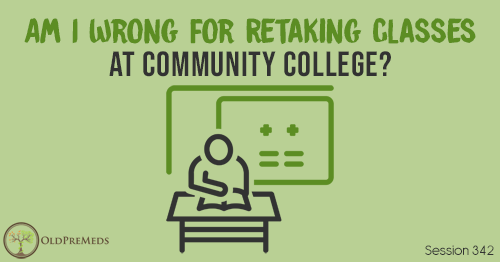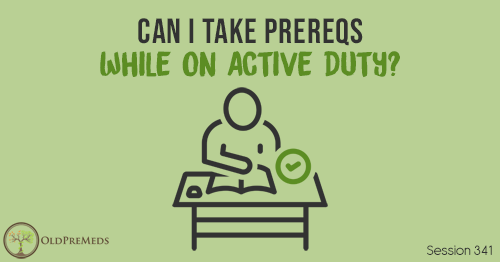Apple Podcasts | Google Podcasts
Session 336
This episode discusses a question from a student who is on their third application cycle without any interview invites. What should they check in their application, and would meeting with an advisor to thoroughly review their materials be a great idea?
Questions answered here on the podcast are taken directly from premedhangout.com. Go ask your questions there and use #OPMquestion.
Also, please be sure to check out all our other podcasts on Meded Media as we try to bring you as many resources as you need on this journey.
Listen to this podcast episode with the player above, or keep reading for the highlights and takeaway points.
The MCAT Minute
The MCAT Minute is brought to you by Blueprint MCAT.
As a nontraditional student, your time constraints can often be more significant than those of traditional students. This means that when you’re preparing for the MCAT, you need to maximize efficiency and effectiveness.
Go to Blueprint MCAT and sign up for a free account. This will grant you access to an exceptional study planner tool that outlines everything you need for your MCAT study journey. This includes full-length exams and all the necessary content knowledge, helping you organize and streamline your study schedule.
OldPreMeds Question of the Week
“As a non-traditional applicant, I’m currently in my third application cycle with a few rejections and holds but no interview invites. I didn’t receive any invites during my first two cycles, which I believe was due to a poor narrative and personal statement that exhibited several flaws you’ve mentioned in your Application Renovation videos. These include speaking negatively about certain aspects of medicine, not sharing personal stories, and discussing why I would make a good doctor instead of why I want to be one.
My cumulative GPA is 3.65, science GPA is 3.6, and my MCAT score is 520. Unfortunately, this score will expire for almost all schools after this cycle. Given that I’ve been out of school for a while, do you think it would be beneficial for me to pursue a post-baccalaureate or Special Master’s Program (SMP) to demonstrate to schools that I still have the academic ability and to boost my GPA? I understand that I will need to retake the MCAT as well.
In terms of experience, I have spent several thousand hours in an infectious disease research lab, completed 150 hours of community service, and have over 1,000 hours of experience as a scribe. I acknowledge that I may be lacking in service hours and plan to work on this, although opportunities were limited for several years due to COVID-19 restrictions and personal health issues.
I would greatly appreciate any advice you could provide.”
Why a Strong Candidate Struggles with Medical School Applications
A candidate who has been out of school for some time, currently in their third application cycle with no interview invites, raises red flags. Despite a strong MCAT score of 520 and a respectable GPA of 3.6, something seems amiss with their application process.
Without having their application at hand, it’s challenging to pinpoint the exact issue. However, several factors come into play when considering potential roadblocks. The statistics don’t appear to present a problem – such credentials should not be a barrier to many, if any, institutions.
This scenario calls for a thorough examination of all aspects of the application. There seems to be an underlying issue that is hindering progress despite the seemingly strong academic performance.
The Importance of Clinical Experience and Narratives in Medical School Applications
Let’s delve into the area of clinical experience. This particular applicant has logged 1,000 hours of scribing, which, on the surface, shouldn’t pose a problem. However, without more context or access to their application, it’s challenging to gauge the relevance or impact of this experience.
Was this scribing experience acquired ten years ago? What’s the timeline for all these activities? The applicant also has research experience, which they seem to be continually expanding – an excellent attribute. However, I didn’t notice any mention of shadowing. Does the applicant have any shadowing experience?
Another critical aspect to consider is the narrative the student presents. Based on their comments about our Application Renovation videos (found on our YouTube channel), it seems like they’re trying to improve their story.
'There's no perfect way to write an application.”Click To TweetThis is where things get tricky because there isn’t a one-size-fits-all approach to crafting a successful medical school application. My recommendations are based on my personal experiences and countless conversations with Deans, Directors of Admissions, and numerous students we’ve helped gain admission into medical school. It’s about how you write your personal statement, secondary essays, activity descriptions, and overall application.
Seeking Professional Guidance: A Thorough Review of Your Medical School Application
What I would suggest is arranging a 30-minute or an hour-long consultation with one of our team members. While I typically don’t use this podcast to promote our advising services, I believe this student could greatly benefit from an in-depth session.
This advising session would involve a meticulous examination of the application, discussion about the school list, and a review of the letters of recommendation. The goal is to identify any glaring red flags that the student might be overlooking due to their close proximity to the situation.
Sometimes, an external perspective can shed light on areas of improvement that may have been previously missed. So don’t hesitate – schedule your call today.
The Nuts and Bolts of Medical School Applications: Understanding Prerequisites and Requirements
Another fundamental aspect to consider is the basic requirements, such as the age of prerequisite courses. Some medical schools may require more recent prerequisites, and if yours are too old, this could be a potential barrier. Resources like the MSAR and individual school websites typically provide this information, so it’s crucial to ensure you meet all the requisite criteria.
It’s possible that your application isn’t even being considered if your prerequisites don’t align with the school’s requirements. The admissions committee might simply dismiss it, thinking, “The prerequisites are too outdated; we need more recent ones.”
As you navigate this process, it’s essential to identify the potential issues – is it problem A, B, C, D, E, F, G? Or perhaps it’s a combination of factors. This comprehensive analysis is what we undertake when reviewing a student’s application to pinpoint the areas of concern.
Occasionally, and this is rare, I’ll review an application and find myself at a loss as to why the applicant isn’t receiving any interviews. While these instances are few and far between, they do occur, underscoring the complexity and nuance involved in the application process.
Crafting a Strategic Game Plan
Before you consider investing in a post-baccalaureate program or Special Master’s Program (SMP), I would recommend scheduling a consultation with one of our advisors. Typically, an hour-long session is sufficient to comprehensively review your applications and identify potential areas of concern. Together, we can develop a strategic game plan to enhance your application and increase your chances of success in future application cycles.
The goal is not just to make arbitrary decisions in the dark but to make informed choices based on a thorough understanding of your situation.
I believe there is something in your application that is noticeably hindering your progress towards securing an interview. Let’s work together, like detectives, to uncover this mystery and chart a path forward. Although it might require some effort, I’m confident that we can help you navigate this journey successfully.
Again, before you submit your application, I would strongly recommend setting up a 30-minute or 60-minute call with one of our advisors. They can help you scan through your application and identify any missing or weak areas, potentially preventing future disappointments.












